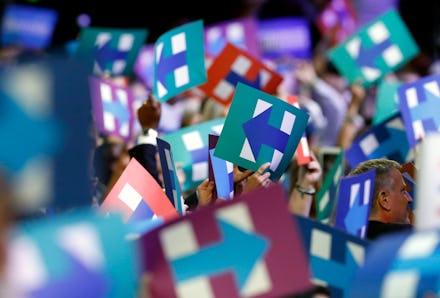The Secret Sexism Against Hillary Clinton That Could Make Donald Trump President

Before Democratic nominee Hillary Clinton's slogan was "I'm With Her" there was "Ready for Hillary," an almost coy reminder of Clinton's exhaustive political career and, some would say, obvious qualifications for president. Clinton was ready — and, on paper, it seemed most people were ready for her.
A CNN/ORC poll in March found 8 in 10 Americans believe the country is "ready" for a female president, a higher percentage than Clinton's first presidential campaign in 2008. But according to the Conversation, even those who say they would vote for a women might not actually follow through in practice.
Because it's not "fashionable or politically correct" to be sexist, wrote Cecilia Hyunjung Mo, an assistant political science professor at Vanderbilt University, many of us never explicitly reveal our subtle biases. What's more, she continued, most of us don't even know we have these secret beliefs to begin with, having developed them over a lifetime.
Among the biggest critiques of Clinton as a presidential candidate is that she's "dishonest" or "untrustworthy" — qualifiers that seem neutral, but may offer a peek into voters' secret gender biases. Julie Dolan, a political science professor at Macalester College, told the Washington Post in May she believes the standards for honesty vary based on a candidate's gender.
"Because the generic female candidate is presumed more honest than the generic male candidate, voters judge a female candidate more harshly if she appears to violate the expectation of honesty," Dolan said.
Mo conducted a study on Florida voters and found that the harder it was for someone to imagine a woman in a leadership role, the less likely they were to vote for a woman. Mo found men, older voters, the less educated, Republicans and even women themselves harbor sexist feelings.
These unconscious beliefs or knee-jerk reactions make up "system 1" of our cognitive processes, according to cognitive psychologists, while "system 2" is the "slower, more deliberative and logical" mechanism we use to reason through new experiences or problems.
Mo said we can begin to work through our subtle biases by letting system 2 take the wheel.
"If we are aware that we may have these biases," she wrote, "we can begin regulating our own behavior."
Read more: